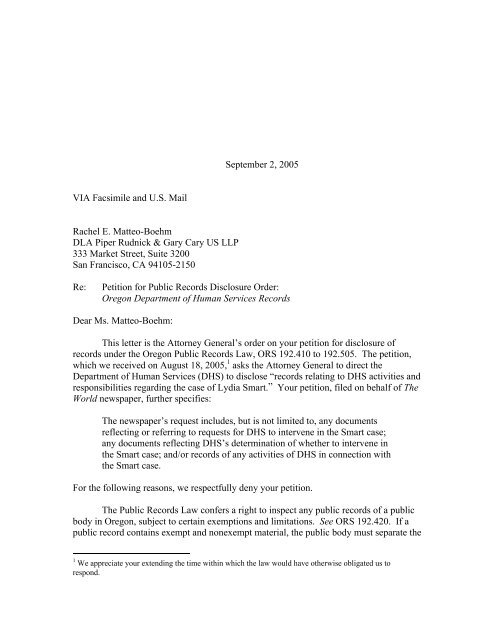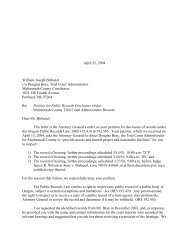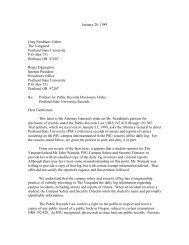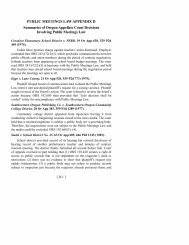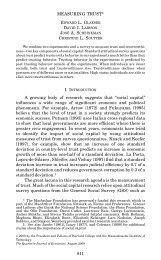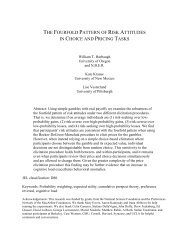September 2, 2005 VIA Facsimile and U.S. Mail Rachel E. Matteo ...
September 2, 2005 VIA Facsimile and U.S. Mail Rachel E. Matteo ...
September 2, 2005 VIA Facsimile and U.S. Mail Rachel E. Matteo ...
Create successful ePaper yourself
Turn your PDF publications into a flip-book with our unique Google optimized e-Paper software.
<strong>September</strong> 2, <strong>2005</strong><br />
<strong>VIA</strong> <strong>Facsimile</strong> <strong>and</strong> U.S. <strong>Mail</strong><br />
<strong>Rachel</strong> E. <strong>Matteo</strong>-Boehm<br />
DLA Piper Rudnick & Gary Cary US LLP<br />
333 Market Street, Suite 3200<br />
San Francisco, CA 94105-2150<br />
Re:<br />
Petition for Public Records Disclosure Order:<br />
Oregon Department of Human Services Records<br />
Dear Ms. <strong>Matteo</strong>-Boehm:<br />
This letter is the Attorney General’s order on your petition for disclosure of<br />
records under the Oregon Public Records Law, ORS 192.410 to 192.505. The petition,<br />
which we received on August 18, <strong>2005</strong>, 1 asks the Attorney General to direct the<br />
Department of Human Services (DHS) to disclose “records relating to DHS activities <strong>and</strong><br />
responsibilities regarding the case of Lydia Smart.” Your petition, filed on behalf of The<br />
World newspaper, further specifies:<br />
The newspaper’s request includes, but is not limited to, any documents<br />
reflecting or referring to requests for DHS to intervene in the Smart case;<br />
any documents reflecting DHS’s determination of whether to intervene in<br />
the Smart case; <strong>and</strong>/or records of any activities of DHS in connection with<br />
the Smart case.<br />
For the following reasons, we respectfully deny your petition.<br />
The Public Records Law confers a right to inspect any public records of a public<br />
body in Oregon, subject to certain exemptions <strong>and</strong> limitations. See ORS 192.420. If a<br />
public record contains exempt <strong>and</strong> nonexempt material, the public body must separate the<br />
1 We appreciate your extending the time within which the law would have otherwise obligated us to<br />
respond.
<strong>Rachel</strong> <strong>Matteo</strong>-Boehm<br />
<strong>September</strong> 2, <strong>2005</strong><br />
Page 2<br />
materials <strong>and</strong> make the nonexempt material available for examination if it is “reasonably<br />
possible” to do so while preserving the confidentiality of the exempt material. Turner v.<br />
Reed, 22 Or App 177, 186 n8, 538 P2d 373 (1975).<br />
We have reviewed your petition <strong>and</strong> the attached denial of The World’s request by<br />
DHS Tort Liability & Legislative Coordinator Caroline Burnell. Ms. Burnell denied The<br />
World’s request in its entirety by citing several statutory exemptions from disclosure,<br />
including: ORS 192.501(3) (exempting investigatory information compiled for criminal<br />
law purposes); ORS 192.502(2) (exempting personal information the disclosure of which<br />
would constitute an unreasonable invasion of privacy); ORS 192.502(8) (exempting<br />
public records made confidential under federal law); <strong>and</strong> ORS 192.502(9) (exempting<br />
public records made privileged or confidential under state law).<br />
You have stated in your petition that “none of these exemptions trumps the<br />
affirmative requirement in ORS 409.225(6) that records pertaining to DHS activities <strong>and</strong><br />
responsibilities must be released in those cases where an adult is charged with a crime<br />
related to child abuse or neglect.” ORS 409.225(6) provides:<br />
Notwithst<strong>and</strong>ing subsection (1) of this section, unless exempt from<br />
disclosure under ORS chapter 192, the department [DHS] shall disclose<br />
information related to the department’s activities <strong>and</strong> responsibilities in a<br />
case where child abuse or neglect has resulted in a child fatality or near<br />
fatality or where an adult has been charged with a crime related to child<br />
abuse or neglect.<br />
(Emphasis added). The text of this statutory provision clearly incorporates by reference<br />
all of the exemptions contained in ORS chapter 192. Thus, applicable exemptions may<br />
be cited as a basis for withholding records responsive to your petition that would<br />
otherwise be subject to disclosure under ORS 409.225(6).<br />
Your petition repeatedly notes that The World is seeking "only administrative<br />
information regarding the agency's activities <strong>and</strong> responsibilities with regard to Lydia<br />
Smart," as opposed to information that "implicate[s] personal privacy." Pet at 4. Thus, in<br />
reviewing the records provided by DHS, we have judged records that pertain to the case<br />
regarding Lydia Smart but do not relate to DHS' activities <strong>and</strong> responsibilities as not<br />
responsive to your petition, <strong>and</strong> they are not addressed further in this order.<br />
Pursuant to our discussions with DHS staff about the records responsive to your<br />
petition, the agency has agreed to disclose approximately 120 records to you. Some<br />
records are wholly subject to disclosure <strong>and</strong> will thus be disclosed in their entirety.<br />
Others contain both exempt <strong>and</strong> nonexempt information, so that DHS will disclose<br />
redacted copies of the records to you. Approximately 100 records are exempt from<br />
disclosure in their entirety. The applicable exemptions are ORS 192.502(8), exempting<br />
records or information the disclosure of which is “prohibited by federal law or<br />
regulations,” <strong>and</strong> ORS 192.502(9), exempting records or information the disclosure of
<strong>Rachel</strong> <strong>Matteo</strong>-Boehm<br />
<strong>September</strong> 2, <strong>2005</strong><br />
Page 3<br />
which is “prohibited or restricted or otherwise made confidential or privileged under<br />
Oregon law.”<br />
As to the records or portions thereof that DHS has agreed to disclose to you, your<br />
petition is denied as moot. The remainder of this order pertains to the records that are<br />
being partially or entirely withheld from disclosure. First, we identify <strong>and</strong> discuss the<br />
underlying federal statutes <strong>and</strong> regulations that prohibit disclosure of responsive records,<br />
either in part or in their entirety, under ORS 192.502(8). We then undertake the same<br />
analysis in relation to state statutes supporting the exemption of records under ORS<br />
192.502(9).<br />
1. Federal law<br />
Several records responsive to your petition contain information which one or both<br />
of the following federal laws require be withheld from disclosure.<br />
a. HIPAA<br />
Your petition states that DHS does not appear to qualify as a “covered entity” for<br />
purposes of the Health Insurance Portability <strong>and</strong> Accountability Act of 1996 (HIPAA).<br />
Pet at 5. However, DHS is in fact a covered entity due, among other reasons, to its role<br />
as the state Medicaid agency. Because DHS is a covered entity, it is prohibited from<br />
disclosing “protected health information” except as permitted or required under federal<br />
law. 45 CFR § 164.502(a). Generally, “protected health information” is “individually<br />
identifiable health information.” 2 45 CFR § 160.103.<br />
DHS has been appointed as Lydia’s guardian under ORS 419B.370 <strong>and</strong> thus is<br />
authorized to make medical <strong>and</strong> health care decisions on her behalf. Under federal<br />
HIPAA regulations, as Lydia’s guardian, DHS may consent to disclosure of her protected<br />
health information. 3 45 CFR § 164.502(g)(3). DHS has consented <strong>and</strong> agrees to disclose<br />
to you several records which contain Lydia’s protected health information, to the extent<br />
that they relate to DHS’ activities <strong>and</strong> responsibilities in her case. Your petition states<br />
that DHS may redact Lydia’s protected health information from such records, Pet. at 5,<br />
<strong>and</strong> it has done so.<br />
2 “Individually identifiable health information” is information that (i) is created or received by a covered<br />
entity; (ii) “[r]elates to the past, present, or future physical or mental health or condition of an individual;<br />
the provision of health care to an individual; or the past, present, or future payment for the provision of<br />
health care to an individual,” <strong>and</strong> (iii) either identifies the individual or for which “there is a reasonable<br />
basis to believe the information can be used to identify the individual.” 45 CFR § 301.<br />
3 This authority is also recognized under state law. See ORS 192.519(10) (“personal representative”<br />
includes guardian appointed under ORS 419B.370) <strong>and</strong> ORS 192.520 (health care provider or state health<br />
plan may disclose protected health information consistent with personal representative’s authorization).
<strong>Rachel</strong> <strong>Matteo</strong>-Boehm<br />
<strong>September</strong> 2, <strong>2005</strong><br />
Page 4<br />
DHS does not have authority to disclose records that contain protected health<br />
information of individuals other than Lydia. HIPAA regulations provide that such<br />
records may be disclosed if they can be redacted so as to “de-identify” the information.<br />
45 CFR § 164.514(b)(2). However, de-identification is not sufficient to permit disclosure<br />
if the covered entity has “actual knowledge that the information could be used alone or in<br />
combination with other information to identify an individual who is a subject of the<br />
information.” Id. Due to the small number of persons involved in the Lydia Smart case,<br />
there is sufficient reason to believe that redactions will not result in the de-identification<br />
required by federal law. Therefore, responsive records which contain protected health<br />
information about persons other than or in addition to Lydia Smart are prohibited from<br />
disclosure by HIPAA <strong>and</strong> are being withheld under ORS 192.502(8).<br />
b. Title IV-E of the Social Security Act<br />
Disclosure of DHS records regarding applicants or recipients of foster care<br />
payments is restricted by 42 USC § 671 (Title IV-E of the Social Security Act). This<br />
statute requires states to provide safeguards that restrict the use or disclosure of<br />
information concerning applicants or recipients to “purposes directly related to the<br />
administration” of the program. The state has taken those steps through ORS 411.320<br />
<strong>and</strong> 418.130. 4 The federal implementing regulations, located at 45 CFR § 1355.21(a) <strong>and</strong><br />
1355.30 <strong>and</strong> incorporating by reference 45 CFR § 205.50, safeguard information such as<br />
names, address, social <strong>and</strong> economic conditions, <strong>and</strong> medical information. The World’s<br />
records request is not directly related to the administration of the state’s foster care<br />
program. Thus, your petition is denied to the extent responsive records are made<br />
confidential under federal law.<br />
4 ORS 411.320(1) provides that:<br />
For the protection of applicants for <strong>and</strong> recipients of public assistance, except as<br />
otherwise provided in this section, [DHS] shall not disclose or use the contents of any records,<br />
files, papers or communications for the purposes other than those directly connected with the<br />
administration of the public assistance laws of Oregon or as necessary to assist public assistance<br />
applicants <strong>and</strong> recipients in accessing <strong>and</strong> receiving other governmental or private nonprofit<br />
services, <strong>and</strong> these records, files, papers <strong>and</strong> communications are considered confidential subject<br />
to the rules <strong>and</strong> regulations of [DHS]. In any judicial or administrative proceedings, except<br />
proceedings directly connected with the administration of public assistance or child support<br />
enforcement laws, their contents are considered privileged communications.<br />
ORS 418.130 provides that:<br />
Except as otherwise provided in this section <strong>and</strong> except for purposes directly connected<br />
with the administration of temporary assistance for needy families program, delivery or<br />
administration of programs <strong>and</strong> services [DHS] is authorized to deliver <strong>and</strong> administer pursuant to<br />
ORS 409.010 or as necessary to assist public assistance applicants <strong>and</strong> recipients in accessing <strong>and</strong><br />
receiving other governmental or private nonprofit services <strong>and</strong> in accordance with the rules of<br />
[DHS], a person may not solicit, disclose, receive, make use of, or authorize, knowingly permit,<br />
participate in, or acquiesce in the use of, any list of or names of, or any information concerning,<br />
persons applying for or receiving such aid, directly or indirectly derived from the records, papers,<br />
files or communications of [DHS] or acquired in the performance of official duties.
<strong>Rachel</strong> <strong>Matteo</strong>-Boehm<br />
<strong>September</strong> 2, <strong>2005</strong><br />
Page 5<br />
2. State law<br />
Several records responsive to your petition contain information which one or<br />
more of the following state laws make confidential.<br />
a. Child welfare records, files, papers <strong>and</strong> communications – ORS 409.225<br />
Subsection (1) of ORS 409.225 makes confidential child welfare records<br />
maintained by DHS:<br />
In the interest of family privacy <strong>and</strong> for the protection of children, families<br />
<strong>and</strong> other recipients of services, the Department of Human Services shall<br />
not disclose or use the contents of any child welfare records, files, papers<br />
or communications that contain any information about an individual child,<br />
family or other recipient of services for purposes other than those directly<br />
connected with the administration of child welfare laws or unless required<br />
or authorized by ORS 419A.255 or 419B.035. The records, files, papers<br />
<strong>and</strong> communications are confidential <strong>and</strong> are not available for public<br />
inspection. General information, policy statements, statistical reports or<br />
similar compilations of data are not confidential unless such information is<br />
identified with an individual child, family or other recipient of services or<br />
protected by other provision of law.<br />
(Emphasis added.) The consequence of ORS 409.225(6), reprinted on page 2 above, is<br />
that responsive records which would otherwise be exempt due only to the terms of ORS<br />
409.225(1) must be disclosed, to the extent that the information they contain relates to<br />
DHS’ activities <strong>and</strong> responsibilities. DHS has agreed to disclose this information to you.<br />
However, to the extent that DHS’ child welfare records in the Lydia Smart case also<br />
contain information about a child, family or other recipient of services which does not<br />
reflect upon DHS’ activities <strong>and</strong> responsibilities, they remain confidential under ORS<br />
409.225(1) <strong>and</strong> are exempt under ORS 192.502(9). 5<br />
ORS 409.225(2) <strong>and</strong> (3) require DHS to disclose child welfare records in<br />
specified contexts, but none of them include responding to media requests for records.<br />
Also, we have no reason to believe that the waiver of confidentiality identified in<br />
subsection (5) of the statute exists in relation to the records responsive to your request.<br />
Thus, we deny your petition with respect to responsive child welfare records to the extent<br />
that they are not related to DHS’ activities <strong>and</strong> responsibilities.<br />
5 By way of example, under ORS 409.225(6), DHS is disclosing forms authorizing the release of medical<br />
information to or from DHS because such records show the actions taken by the agency. However, it is not<br />
disclosing the substance of the medical information in the records received or disclosed pursuant to the<br />
authorization form.
<strong>Rachel</strong> <strong>Matteo</strong>-Boehm<br />
<strong>September</strong> 2, <strong>2005</strong><br />
Page 6<br />
b. Child abuse reports – ORS 419B.035<br />
ORS 419B.035(1) makes “confidential” the reports <strong>and</strong> investigations of child<br />
abuse made pursuant to ORS 419B.010 to 419B.030. 6 The World’s request <strong>and</strong> your<br />
petition do not come within the limited situations stated in ORS 419B.035(1) <strong>and</strong> (2) in<br />
which DHS either must or may disclose such records. 7<br />
When a state statute, such as ORS 419B.035(2), 8 provides a state agency with<br />
limited discretion to disclose records that otherwise must be withheld, this office reviews<br />
the agency’s decision to withhold records to determine if it was an abuse of discretion.<br />
See Public Records Orders, Sept. 24, 2001 (Nielson) <strong>and</strong> March 2, 1993 (McMinimee).<br />
As stated in the Nielson PRO:<br />
To find an abuse of discretion under ORS 419B.035(2), we would need to<br />
find that DHS determined that disclosure was “necessary” to its<br />
administration of child welfare services <strong>and</strong> in the best interests of the<br />
child, or that disclosure was “necessary” to investigate, prevent or treat<br />
child abuse <strong>and</strong> neglect, or to protect children from abuse <strong>and</strong> neglect, but<br />
that DHS intentionally chose not to make this necessary disclosure.<br />
We have no basis to conclude in this instance that DHS has abused its discretion in<br />
refusing to disclose the records you seek. 9<br />
6 Child abuse reports <strong>and</strong> investigatory records regarding Lydia Smart may constitute criminal investigatory<br />
material under ORS 192.501(3). Because these records are exempt under ORS 192.502(9), we do not<br />
address the potential applicability of ORS 192.501(3) or exemptions stated in ORS 192.501 <strong>and</strong> 192.502.<br />
7 ORS 419B.035 was amended by Oregon Laws <strong>2005</strong>, chapter 659. However, the amendments are not<br />
germane to your petition.<br />
8 ORS 419B.035(2) reads:<br />
The Department of Human Services may make reports <strong>and</strong> records available to any person,<br />
administrative hearings officer, court, agency, organization or other entity when the department<br />
determines that such disclosure is necessary to administer its child welfare services <strong>and</strong> is in the<br />
best interests of the affected child, or that such disclosure is necessary to investigate, prevent or<br />
treat child abuse <strong>and</strong> neglect, to protect children from abuse <strong>and</strong> neglect or for research when the<br />
Director of Human Services gives prior written approval. The Department of Human Services<br />
shall adopt rules setting forth the procedures by which it will make the disclosures authorized<br />
under this subsection <strong>and</strong> subsection (1) of this section. The name, address <strong>and</strong> other identifying<br />
information about the person who made the report may not be disclosed pursuant to this<br />
subsection <strong>and</strong> subsection (1) of this section.<br />
9 ORS 419B.035(2) also permits DHS to disclose records when “necessary * * * for research.” Pursuant to<br />
OAR 410-014-0000(40), DHS defines “research” to mean “[a] systematic investigation, including research<br />
development, testing, <strong>and</strong> evaluation, designed to develop or contribute to generalizable knowledge.” We<br />
have no basis to believe that your client's request is related to such efforts.
<strong>Rachel</strong> <strong>Matteo</strong>-Boehm<br />
<strong>September</strong> 2, <strong>2005</strong><br />
Page 7<br />
c. Juvenile court records – ORS 419A.255<br />
To the extent that responsive records constitute “juvenile court records,” they are<br />
also confidential under ORS 419A.255. 10 Your petition states that this statutory m<strong>and</strong>ate<br />
of confidentiality is irrelevant because The World is seeking disclosure of only<br />
“administrative information regarding the agency’s activities <strong>and</strong> responsibilities with<br />
regard to Lydia Smart.” Pet at 4. However, not only records created by the juvenile<br />
court, such as its orders <strong>and</strong> judgments, are affected by ORS 419A.255. Any records<br />
submitted to the court by the parties are likewise prohibited from disclosure.<br />
ORS 419A.255(1) provides that juvenile court “legal” records are available only<br />
to specified categories of individuals. ORS 419A.255(2), (3), <strong>and</strong> (6) provide that<br />
information in the juvenile court “social file” relating to a child’s history <strong>and</strong> prognosis is<br />
privileged <strong>and</strong> may be disclosed only to specified categories of individuals. You are not<br />
included in the category of individuals that may have access to either type of record<br />
maintained by DHS. Disclosure of such information to persons other than those<br />
specifically listed in the statute requires the juvenile court’s consent, which you have not<br />
provided to DHS. See ORS 419A.255(3). Thus, such records are exempt under ORS<br />
192.502(9) <strong>and</strong> ORS 419A.255.<br />
d. Written accounts by health care services providers – ORS 179.505<br />
Some responsive records consists wholly or partially of “written accounts” of<br />
individuals served by a “health care services provider,” as those terms are defined in ORS<br />
179.505(1). In addition to other applicable exemptions, these accounts are confidential<br />
under ORS 179.505(2), which provides:<br />
Except as provided in subsections (3), (4), (6), (7), (8), (9), (11), (14),<br />
(15), (16), <strong>and</strong> (17) of this section or unless otherwise permitted or<br />
required by state or federal law or by order of the court, written accounts<br />
of the individuals served by any health care services provider * * * are not<br />
subject to access <strong>and</strong> may not be disclosed.”<br />
ORS 179.505(3) provides: “If the individual or a personal representative of the individual<br />
provides an authorization, the content of any written account referred to in subsection (2)<br />
of this section must be disclosed accordingly[.]” As Lydia Smart’s appointed guardian,<br />
DHS is Lydia’s personal representative for purposes of ORS 179.505. 179.505(1)(d).<br />
DHS has consented to the disclosure of several affected records that reflect upon<br />
DHS’ activities <strong>and</strong> responsibilities in the case of Lydia Smart <strong>and</strong> will redact substantive<br />
medical information about Lydia, as discussed under our analysis of the HIPAA<br />
restrictions. DHS does not have authority to disclose written accounts of individuals<br />
served by a health care services provider that pertain to other individuals, <strong>and</strong> none of the<br />
10 See also Or Laws <strong>2005</strong>, ch 451.
<strong>Rachel</strong> <strong>Matteo</strong>-Boehm<br />
<strong>September</strong> 2, <strong>2005</strong><br />
Page 8<br />
other exceptions contained in ORS 179.505 allow disclosure of this information to you.<br />
For these reasons, we deny your petition for records protected by ORS 179.505 except to<br />
the extent that they relate to DHS’ activities <strong>and</strong> responsibilities.<br />
e. Foster parent information – ORS 418.642<br />
In addition to the restrictions stated in 42 USC § 671 with regard to foster care<br />
payments, state law makes confidential records that contain information about foster<br />
parents. ORS 418.642(1) provides:<br />
Notwithst<strong>and</strong>ing ORS 192.410 to 192.505, the name, address <strong>and</strong> other<br />
identifying information about a person who maintains a foster home are<br />
confidential <strong>and</strong> not accessible for public inspection.<br />
Because DHS may not disclose the names, addresses, <strong>and</strong> other identifying information<br />
regarding foster parents, it will redact such information from records it is disclosing to<br />
you. Accordingly, your petition is denied with respect to this information.<br />
f. Privileges – ORS 40.225 & 40.230<br />
Some of the records responsive to your request contain information that is<br />
privileged pursuant to ORS 40.225 (lawyer-client privilege) 11 <strong>and</strong> ORS 40.230<br />
(psychotherapist-patient privilege). 12 To the extent that records contain information<br />
11 ORS 40.225 (OEC 503) provides:<br />
(2) A client has a privilege to refuse to disclose <strong>and</strong> to prevent any other person from disclosing<br />
confidential communications made for the purpose of facilitating the rendition of professional legal<br />
services to the client:<br />
(a) Between the client or the client’s representative <strong>and</strong> the client’s lawyer or a representative of the<br />
lawyer;<br />
(b) Between the client’s lawyer <strong>and</strong> the lawyer’s representative;<br />
(c) By the client or the client’s lawyer to a lawyer representing another in a matter of common interest;<br />
(d) Between representatives of the client or between the client <strong>and</strong> a representative of the client; or<br />
(e) Between lawyers representing the client.<br />
12<br />
ORS 40.230 (OEC 504) provides:<br />
(2) A patient has a privilege to refuse to disclose <strong>and</strong> to prevent any other person from disclosing<br />
confidential communications made for the purposes of diagnosis or treatment of the patient’s mental or<br />
emotional condition among the patient, the patient’s psychotherapist or persons who are participating in the<br />
diagnosis or treatment under the direction of the psychotherapist, including members of the patient’s<br />
family.<br />
(3) The privilege created by this section may be claimed by:<br />
(a) The patient.<br />
(b) A guardian or conservator of the patient.<br />
(c) The personal representative of a deceased patient.<br />
(d) The person who was the psychotherapist, but only on behalf of the patient. The psychotherapist’s<br />
authority so to do is presumed in the absence of evidence to the contrary.
<strong>Rachel</strong> <strong>Matteo</strong>-Boehm<br />
<strong>September</strong> 2, <strong>2005</strong><br />
Page 9<br />
subject to these privileges, they are exempt from disclosure <strong>and</strong> your petition for them is<br />
denied.<br />
3. Conclusion<br />
DHS has agreed to provide responsive records to you to the extent that they are<br />
not exempt from disclosure due to the terms of ORS 409.225(6). Included within these<br />
records is information related to DHS’ activities <strong>and</strong> responsibilities in the Lydia Smart<br />
case otherwise made confidential under HIPAA to the extent that DHS has authority to<br />
waive confidentiality on behalf of the child to whom it acts as guardian. For the reasons<br />
discussed in the order, all remaining records, or portions of disclosed records, are exempt<br />
from disclosure under either, <strong>and</strong> in some instances both, ORS 192.502(8) or 192.502(9).<br />
For these reasons, we deny your petition.<br />
Sincerely,<br />
PETER D. SHEPHERD<br />
Deputy Attorney General<br />
AGS16207<br />
c: Nancylee Stewart, DHS, Coos Bay


